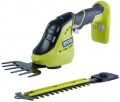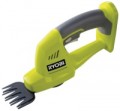Tooth pitch
The distance between the individual teeth of the shrub attachment (see "Tips") supplied with the tool. The
larger the pitch of the teeth, the easier the tool will cope with thick branches, however, the quality of the work will be quite rough. Conversely, more densely spaced teeth work "cleaner" but are less suited to tough conditions and large branches.
Compatible batteries
The name of the battery that is compatible with the device. It helps to buy a spare or find a suitable one in case of a breakdown of the main one.
Weight
The total weight of the brush cutter. Usually indicated for a fully equipped tool, with an attachment installed and, in the case of a petrol engine, a full tank of fuel; however, there may be exceptions. Usually, the relevant data is indicated in the official documentation.
This parameter is important, first of all, taking into account the fact that the tool during work will have to be kept on weight most of the time. Accordingly, the lighter the brush cutter, the longer you can work with it without interruption, the less often you have to rest. On the other hand, a large weight also has its advantages: a heavy tool is more stable and does not “tear out of hand” as much under high loads on the nozzle.

